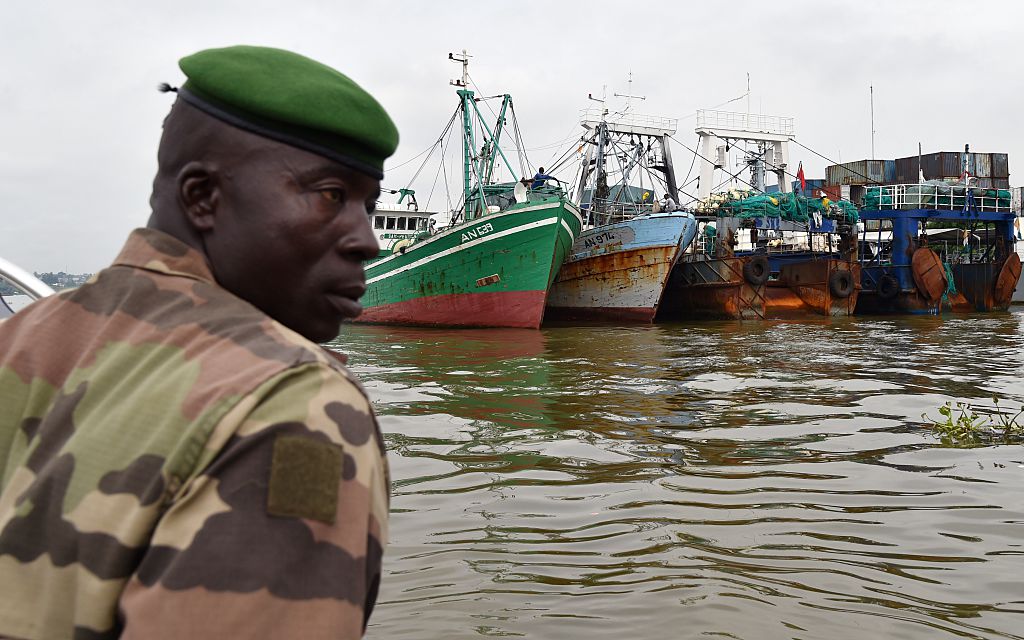ADF STAFF
Illegal, unreported and unregulated (IUU) fishing continued to be a costly issue around the continent in 2022.
That fact was highlighted by an October 2022 report by the Financial Transparency Coalition (FTC) that showed that illegally caught fish costs the continent almost $11.5 billion annually.
The study found that one-third of vessels engaged in illegal fishing in Africa are Chinese and that almost half of the world’s industrial and semi-industrial trawlers involved in illegal fishing operate in Africa.
“Developing countries also lose billions of dollars in illicit money flows due to illegal fishing, yet vessel owners continue operating with complete impunity, using complex company structures and other schemes to hide their identity and evade prosecution,” Matti Kohonen, executive director of the FTC, said on the coalition’s website.
Nowhere on earth is IUU fishing a bigger problem than in West Africa, which loses $9.4 billion annually to illegal fishing, and where 40% of global IUU fishing occurs, according to the FTC. Illegal fishing also drives food insecurity and threatens the livelihoods of the 5.2 million people who work in small-scale African fisheries.
But in 2022, African nations channeled technology and leveraged strategic partnerships to fight back.
Wielding Technology
In 2022, Kenya began building a DNA database of its marine species to conserve its sea resources amid widespread illegal fishing.
The exercise involves harvesting species and cataloging them to help the government prosecute illegal fishing cases. Since the program started, Kenya has produced bar codes for about 115 species, including sharks, rays, crustaceans and mollusks.
“With this scientific exercise, we shall be able to claim our resources since even though fish look similar physically, each has special molecular identification which is associated with a certain region,” Thomas Mkare, a senior research scientist at Kenya Marine and Fisheries Research Institute, told The East African newspaper.
Also in 2022, South Africa began using hydrophones to battle illegal fishing.
Hydrophones can record sounds ranging from scuba diving bubbles to vessel engines to explosives used in blast fishing. Hydrophones signal computer systems operated by law enforcement agencies if sounds indicate that there is possible crime in or near a marine protected area (MPA).
By the end of the year, hydrophones were strategically submerged in MPAs around the country. Nelson Mandela University’s FishFORCE Academy spearheaded the project.
Partnerships Formed
FishFORCE also collaborated with Sea Monster, an immersive technologies company in Cape Town, to develop a virtual game designed for fisheries law enforcement officers. The game presents officers with a range of scenarios meant to teach them how to conduct vessel inspections so that they don’t lose illegal fishing cases on technicalities.
The game is available to the academy’s partners: Comoros, Kenya, Madagascar, Mauritius, Mozambique, Namibia, Reunion, Seychelles and Tanzania. Southern and East Africa lose more than $717 million to IUU fishing annually, according to research by the United Nations Food and Agricultural Organization.
Benin became the first African nation to commit to publicly share data about fishing vessels in its waters when it partnered with Global Fishing Watch (GFW) in May.
Benin established a vessel-monitoring system (VMS) and shared its data through GFW’s map. Before Benin’s VMS system was established, the partnership helped track all fishing vessels operating in Beninese waters using an automatic identification system, and in adjacent waters outside Benin’s exclusive economic zone.
“Through our partnership with Global Fishing Watch, we can strengthen our ability to monitor fishing activity, enforce the law and demonstrate our commitment to transparency in support of a blue economy,” Gaston Cossi Dossouhoui, Benin’s minister for agriculture, livestock and fisheries, said in a news release.
Also in 2022, the Regional Monitoring, Control and Surveillance Center (RMCSC) helped Benin, Côte d’Ivoire, Ghana, Liberia, Nigeria and Togo manage their fishing sectors. Headquartered in Tema, Ghana, the center is equipped with vessel-tracking systems and can collect data on authorized fishing vessels across the region.
“The RMCSC’s establishment brings us a step closer to having coordinated approaches to joint action, including patrols for better security in the maritime domain of our region,” said Seraphin Dedi, secretary-general of the Fisheries Committee for the West Central Gulf of Guinea.

